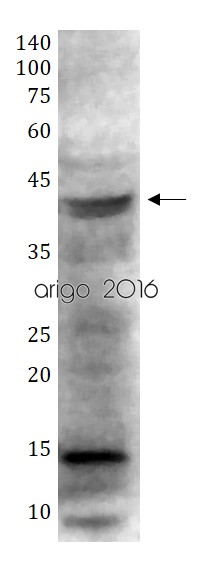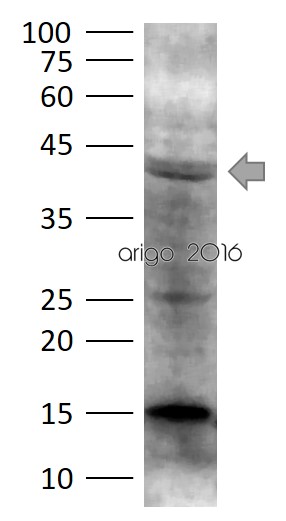ARG63832
anti-VDR antibody
anti-VDR antibody for Western blot and Human
Cancer antibody; Gene Regulation antibody; Signaling Transduction antibody

2
Overview
| Product Description | Goat Polyclonal antibody recognizes VDR |
|---|---|
| Tested Reactivity | Hu |
| Predict Reactivity | Ms, Rat, Dog |
| Tested Application | WB |
| Specificity | Both transcript variants (NP_000367; NP_001017535) encode the same protein. |
| Host | Goat |
| Clonality | Polyclonal |
| Isotype | IgG |
| Target Name | VDR |
| Antigen Species | Human |
| Immunogen | CGNQDYKYRVSD |
| Conjugation | Un-conjugated |
| Alternate Names | VDR; PPP1R163; NR1I1; 1,25-dihydroxyvitamin D3 receptor; Nuclear receptor subfamily 1 group I member 1; Vitamin D3 receptor; Vitamin D Receptor |
Application Instructions
| Application Suggestion |
|
||||
|---|---|---|---|---|---|
| Application Note | WB: Recommend incubate at RT for 1h. * The dilutions indicate recommended starting dilutions and the optimal dilutions or concentrations should be determined by the scientist. |
Properties
| Form | Liquid |
|---|---|
| Purification | Purified from goat serum by antigen affinity chromatography. |
| Buffer | Tris saline (pH 7.3), 0.02% Sodium azide and 0.5% BSA. |
| Preservative | 0.02% Sodium azide |
| Stabilizer | 0.5% BSA |
| Concentration | 0.5 mg/ml |
| Storage Instruction | For continuous use, store undiluted antibody at 2-8°C for up to a week. For long-term storage, aliquot and store at -20°C or below. Storage in frost free freezers is not recommended. Avoid repeated freeze/thaw cycles. Suggest spin the vial prior to opening. The antibody solution should be gently mixed before use. |
| Note | For laboratory research only, not for drug, diagnostic or other use. |
Bioinformation
| Database Links | |
|---|---|
| Gene Symbol | VDR |
| Gene Full Name | vitamin D (1,25- dihydroxyvitamin D3) receptor |
| Background | This gene encodes the nuclear hormone receptor for vitamin D3. This receptor also functions as a receptor for the secondary bile acid lithocholic acid. The receptor belongs to the family of trans-acting transcriptional regulatory factors and shows sequence similarity to the steroid and thyroid hormone receptors. Downstream targets of this nuclear hormone receptor are principally involved in mineral metabolism though the receptor regulates a variety of other metabolic pathways, such as those involved in the immune response and cancer. Mutations in this gene are associated with type II vitamin D-resistant rickets. A single nucleotide polymorphism in the initiation codon results in an alternate translation start site three codons downstream. Alternative splicing results in multiple transcript variants encoding different proteins. [provided by RefSeq, Feb 2011] |
| Function | Nuclear hormone receptor. Transcription factor that mediates the action of vitamin D3 by controlling the expression of hormone sensitive genes. Recruited to promoters via its interaction with BAZ1B/WSTF which mediates the interaction with acetylated histones, an essential step for VDR-promoter association. Plays a central role in calcium homeostasis. [Supplied by Uniprot] |
| Research Area | Cancer antibody; Gene Regulation antibody; Signaling Transduction antibody |
| Calculated MW | 48 kDa |
Images (1) Click the Picture to Zoom In
Customer's Feedback

 Good
Good

 Average
Average





